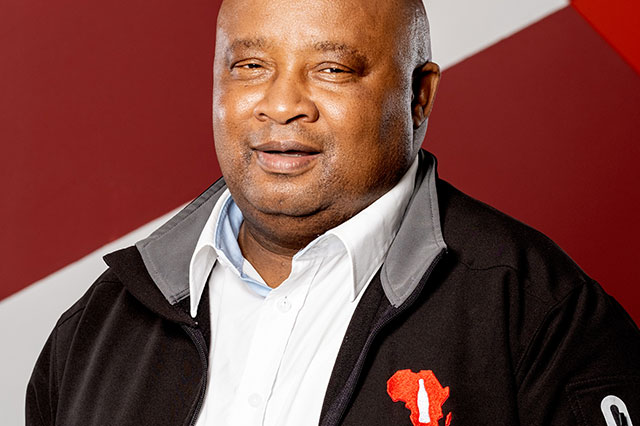The country continues to face the triple challenge of poverty, inequality and unemployment, where more than 51% of vulnerable youth are unemployed.
With South Africa’s overall unemployment rate showing little sign of improvement in the short term, coming in at 32.9% for Q1 of 2023, according to Statistics South Africa, poverty is a daily reality for many and exacerbates the inequality we see all around us.
Now is the time for corporate South Africa to come together with other key stakeholders such as government and the broader civil society to address the issue of unemployment, particularly the plight of unemployed youth.
Young people require access to quality education and to gain the necessary skills to become more employable, as well as creating small-business opportunities through entrepreneurship programmes.
‘It’s important that we instil hope in young people,’ says Velaphi Ratshefola, MD of Coca-Cola Beverages South Africa (CCBSA). ‘At CCBSA, we believe in doing business the right way and not just the easy way, the responsibility to ensure the sustainability of communities is incumbent on all of us.
‘Our strategic framework seeks to embed economic inclusion across our entire value chain and make it part of how we do business the right way. Investing in communities and in the future of our people and our country will ensure the sustainability and success of our own business.
‘For us, opportunity is more than just money, it’s about a better future for people and their communities everywhere on the African continent. Young people are integral to our continent’s shared success. We seek to empower them both in the workplace and through community programmes throughout our markets on the continent, and locally in South Africa,’ he says.
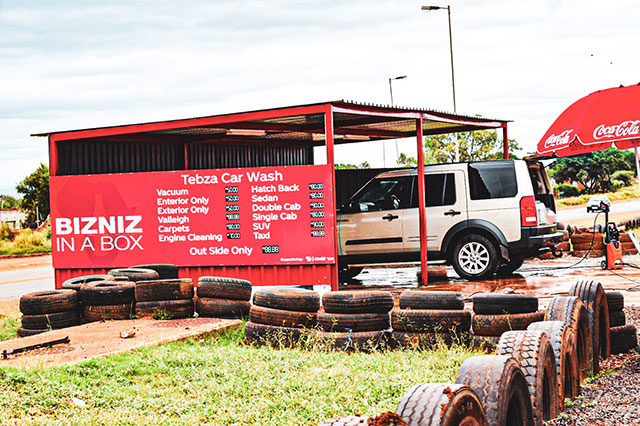
Youth empowerment is central to CCBSA’s sustainability agenda, which is why it has adopted three pillars, namely education, employability, and entrepreneurship as a framework for its economic inclusion strategy.
EDUCATION
Education is a critical tool in eradicating poverty and promoting sustained, inclusive and equitable economic growth for sustainable development. Supporting the educational aspirations of our young people is one way in which we can help turn the tide and create a better future for all in South Africa.
CCBSA launched its Study Buddy Fund in 2021 to assist young people across communities in which CCBSA has operations, to access tertiary education. The fund pays for full tuition, accommodation fees, as well as textbooks as part of a holistic approach to supporting young students.
‘To date, CCBSA has invested more than ZAR8 million to support deserving students,’ says Ratshefola. ‘This is one of our initiatives that I personally am tremendously proud of.’
The Study Buddy programme also includes support groups, career advice and study hacks to give bursary recipients ‘every opportunity at a successful academic career’. The Study Buddy Fund comprises four programme pillars, as follows.
Host Community Bursary programme
The Host Community Bursary programme provides scholarship support to indigent academically strong students who meet entry requirements for access to universities. This financial support covers registration, tuition, accommodation, meal allowances and textbooks.
University partnerships
This provides funding to students already at university but who do not have bursaries and/or NFSAS funding and are often regarded as the ‘missing middle’. Of the more than 80 students CCBSA has supported to date, half were young women.
TVET college support
This targets young people in CCBSA host communities who did not meet university entrance requirements. Instead, the scholarship support focuses on technical skills development, specifically geared towards the CCBSA value chain, ie electrical or mechanical engineering.
Ligbron
This is ‘E-Learning Using Technology’ to improve the teaching and learning of mathematics and science, and CCBSA has supported more than 6,000 students to date.
‘We believe in developing young people into the capable leaders of tomorrow. Be that in communities, society, business or any other arena of life,’ says Ratshefola. ‘We are determined to invest in them through holistic support programmes that offers a plethora of tools, including life skills, to assist the student to reach their full potential.’
EMPLOYABILITY
CCBSA has a number of initiatives that are aimed at helping job seekers find meaningful and sustainable employment. Much of this is centred around skills development, including upskilling or reskilling, to enhance job prospects and increase earning potential.
The success of these programmes is defined by the extent to which it boosts income, unlocks sustainable earning potential, improves skills and business knowledge, resulting in access to economic opportunities.
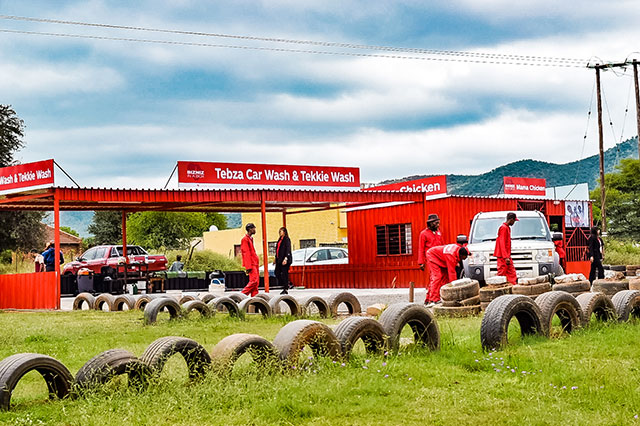
‘We also launched the Mintirho Foundation in 2018, which has successfully disbursed ZAR343.2 million to support 26 agricultural historically disadvantaged beneficiaries that have created much-needed employment in rural communities,’ says Ratshefola. ‘Over 1,540 new jobs have been created, with 57% of these employees being young black females, who are often the backbone of these communities.’
ENTREPRENEURSHIP
The SMME) sector is a vital engine of growth in South Africa, particularly as we still claw back many of the losses due to the impact of the COVID-19 pandemic. Yet starting and then sustaining a small enterprise is not a simple task. Around 70% of SMMEs fail within the first two years, with many entrepreneurs citing lack of funding, proper business skills, as well as access to markets as among the major impediments.
‘We launched our Bizniz in a Box [BiB] initiative in 2016 with a view to creating a platform to support emerging and small businesses, particularly those run by youth and women, and especially in informal and rural areas,’ says Ratshefola.
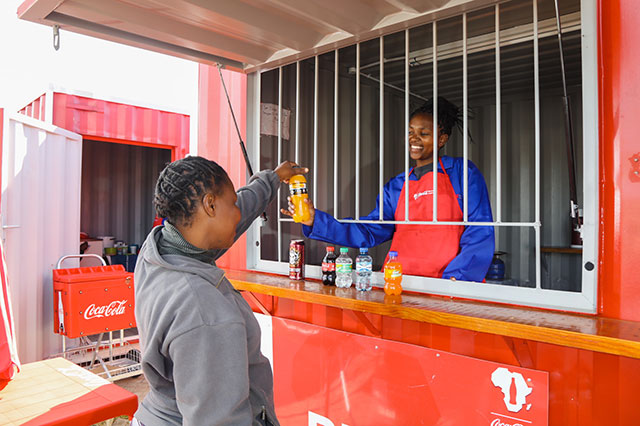
Bizniz in a Box aims to create an ecosystem of viable micro-businesses offering complementary products and services in a community, using a spaza shop as the anchor. These businesses would help cover various needs of the local community, including a business centre/internet café, a car wash, a fast-food shop or a mini baker.
For the past seven years, CCBSA’s BiB has contributed meaningfully towards reducing youth unemployment by partnering with national and provincial government, local municipalities and development finance institutions. These partnerships have enabled entrepreneurs to develop businesses, improve their skills, access capital, manage supply chains and provide jobs to others.
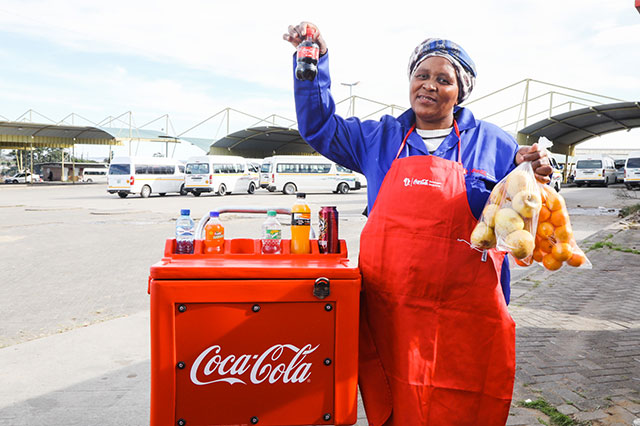
The BiB initiative has supported more than 700 entrepreneurs across several provinces, including Limpopo, Gauteng, Mpumalanga, Eastern Cape and KwaZulu-Natal. CCBSA has provided 758 containers – including 400 for young entrepreneurs – and spent more than ZAR120 million on BiB-related activities.
BEING PART OF THE SOLUTION
‘Economic inclusion needs to be viewed holistically across the entire value chain. We all have a role to play to invest in the future of our country,’ according to Ratshefola.
‘There is an opportunity for all stakeholders to collaborate and co-create solutions that will bring hope to young people, be it providing access to education or helping them build and grow their own businesses, which will ultimately lead to job creation. It’s the decisions we make today that will determine the outcome for future generations.’

